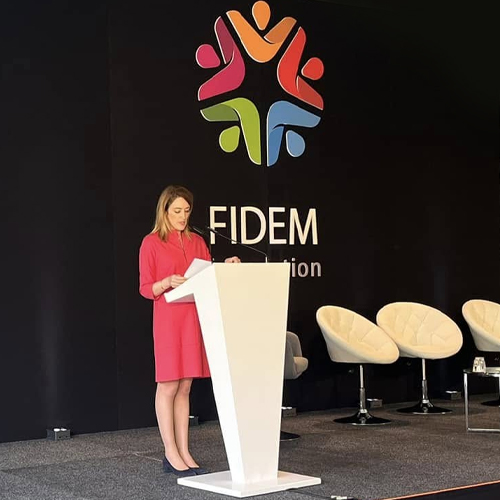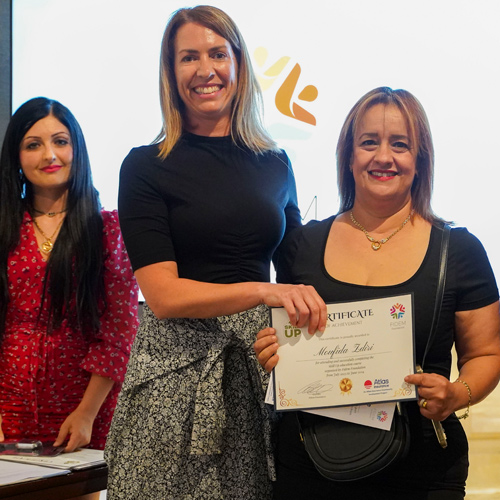The second edition of Fidem Foundation’s Women’s Day Conference brought together over 200 people to discuss and share ideas on the way forward for women’s empowerment in Malta.
This year’s event, entitled “Count her In: Accelerating gender equality through economic empowerment” reflected the priority theme for the United Nations’ 68th Commission on the Status of Women and the UN's chosen slogan for this year's International Women's Day, “Invest in Women: Accelerate Progress”.
Panellists included university academics and educators, economists, representatives of trade bodies such as the Malta Chamber and the Chamber of SMEs, leaders of some of the largest corporates as well as the Malta Women’s Lobby, politicians and policymakers. A number of sixth form students were among our guests.
Fidem founder Dr Sabine Agius Cabourdin said that the fact that Women’s Day still needed to be celebrated meant that we were still a long way off addressing challenges women met on a daily basis in Malta. “While improvements have been registered in matters of equality between women and men, it was only when men and women worked together that meaningful change can be achieved.”
Addressing the conference, Roberta Metsola, President of the European Parliament, said that while “we have come a long way”, none of the achievements in women’s empowerment have come about by accident.
“The reality is that gender equality remains an unfinished business,” she pointed out, adding that “it is important that [women] also find the necessary support and, crucially, the same spectrum of opportunities as men.”
Education is a human right.
The conference opened with a topic which is very close to Fidem Foundation’s heart: education. Reflecting on the title of the session, “Empowering women to participate in the economy”, panel moderator Prof. Carmel Borg remarked that it betrayed a sense of consensus that the economy was something extraneous to the woman, who needed to adapt to it rather than be empowered to changing it to her needs.
Panellists Ylenia Vella of Jobsplus, Ann Marie Cassar from MCAST’s Institute of Community Services, Stephania Cuschieri from the Ministry of Education and Betsson’s HR Director Helen Baker discussed the importance of ensuring that all women are given equal access to education and employment opportunities.
“We have to be the ones to trigger social change,” said Ms Vella, explaining how she is already teaching her young son that it wouldn’t be fair if mum didn’t have access to the same education and job opportunities as daddy.
Ms Cuschieri revealed that the education department is looking at ways to offer a more holistic approach to career guidance.
Ms Baker said that Betsson offered flexible working hours and a gender-neutral working environment.
A lower tax rate for mothers?
The second panel, led by Prof. Anna Borg from the University of Malta’s Centre for Labour Studies, tackled the eternal dilemma of whether a woman can have both a career and a family. It has often been said that we expect women to work like they don’t have children and raise children as if they don’t work. Some 38,000 children benefit from free childcare but the system is not without its flaws as no child-minding service is available 365 days a year, with the burden of compromising between work and family invariably falling on the mother. Prof. Borg noted that in 2024 Malta was far from providing equal opportunities for both genders to be free to make their own choices and that the necessary family-support mechanisms were lacking.
Panellists Natalie Briffa Farrugia, chairperson of Vassallo Group, lawyer Dr Ann Bugeja of GVZH, Abigail Agius Mamo, CEO of the Chamber of SMEs and Christopher Vassallo Cesareo, President of the Malta Chamber, discussed ideas of how to overcome this impasse. Ms Briffa Farrugia suggested working mothers should benefit from lower taxes, a proposal that was welcomed by mother-of-three Abigail Agius Mamo who conceded that for small businesses which are often not much bigger than a family, there are inherent challenges that are not shared by bigger businesses.
“Hybrid work still has its challenges,” added Ms Agius Mamo.
Mr Vassallo Cesareo said that like a company, the Malta Chamber looked at resources rather than genders, and it looked beyond clocking hours in favour of value and production.
“Our work-life balance is gone”
The third panel, moderated by media strategist Ariadne Massa, brought together Opposition MPs Ivan Castillo and Justin Schembri together with government representatives Karen Demicoli from the Ministry for Economy and Melanie Casha Sammut from the Ministry of Education as well as economist and academic Prof. Marie Briguglio to discuss how social protection systems for women can be improved. Both government ministers and Opposition shadow ministers were invited to participate but only Opposition MPs were able to join us with the ministries sending their representatives.
Addressing Malta’s worrying low fertility rate, which is the lowest in Europe, Prof. Briguglio said that “our work-life balance is gone. We are hell-bent on pursing material wealth at the expense of our wellbeing.”
“We need to address the long working hours. We cannot be killing ourselves working,” she continued before appealing to policymakers to reach out to academics who have conducted the research and to base their policies on evidence.
“Listen to those who are struggling”
Gender equality cannot be achieved if violence against women remains a problem. Fidem service user Sabrina Borg, herself a survivor of domestic violence who recently graduated from university with Fidem’s assistance, urged all women to “be an anchor of support to others who are going through domestic violence.”
Fighting back tears during an interview with Times of Malta journalist Claudia Calleja, and with Fidem founder Sabine Agius Cabourdin sitting beside her, Sabrina said: “I would like to be seen as a person not as a problem. A lot of people say a lot of things but not many listen and it is important that we listen to people who are actually going through domestic violence.”
Gender quotas, yes or no?
The conference closed with a discussion about the need to encourage more leadership roles for women. The question about gender quotas received a mixed response ranging from “yes, but” to “it’s a necessary evil”.
Moderating the panel discussion, PR and media consultant Vanessa Macdonald pointed out that children invariably drew images of certain occupations according to their predisposed stereotypical gender biases.
Panellists Kenneth Farrugia, CEO of Bank of Valletta, Sarah Curmi, Audit and Assurance business leader at Deloitte, APS Bank’s Head of Culture Rachael Blackburn and Prof. Marceline Naudi from the Faculty for Social Wellbeing at the University of Malta debated how these gender-biases can be overcome and, in some instances are already being challenged.
The banking sector seems to be one case in point. Mr Farrugia highlighted that 60% of Bank of Valletta’s staff are women with many holding places on board level or in the C-suite. He stressed the importance of the development of human capital that looked beyond gender. Ms Blackburn said 56% of APS Bank’s workforce were female with the majority holding leadership roles in middle management.
Ms Curmi disagreed with gender quotas saying that women should hold positions of power as a result of their capabilities and experience rather than gender-adjustment mechanisms.
Prof Naudi warned some women still suffer financial and economic abuse from their partners who would resort to all means to retain power and control over their victims, including stopping her from working.
Moving forward
The conversation about women’s empowerment must continue beyond that one-day conference. Fidem Foundation will be presenting the government with a report based on the conference proceedings together with a number of proposals.
A special thank you
We would like to thank our sponsors and collaborators for supporting us so generously: APS Bank, Deloitte (Malta), Brown’s Pharmacy, Frank Salt Real Estate Ltd, Miller Distributors Ltd, Xara Lodge, Audience, Charles Grech Ltd, Growth Gurus, and Atlas Insurance Group. Special thanks to our conference co-organisers Working Town.










